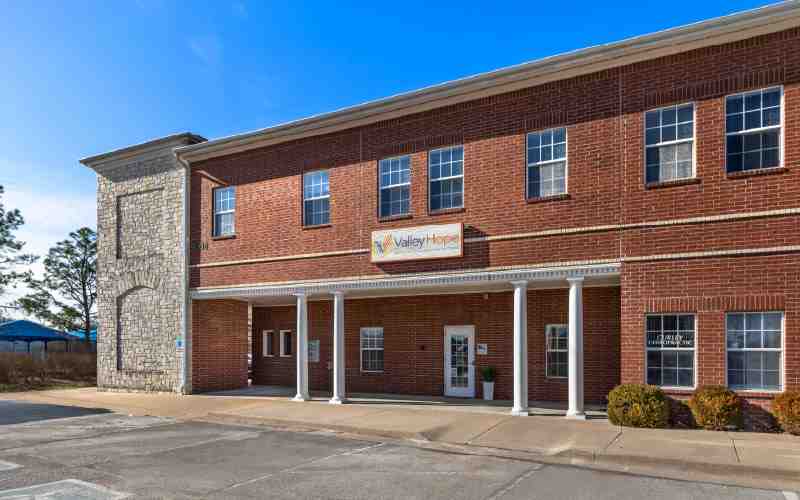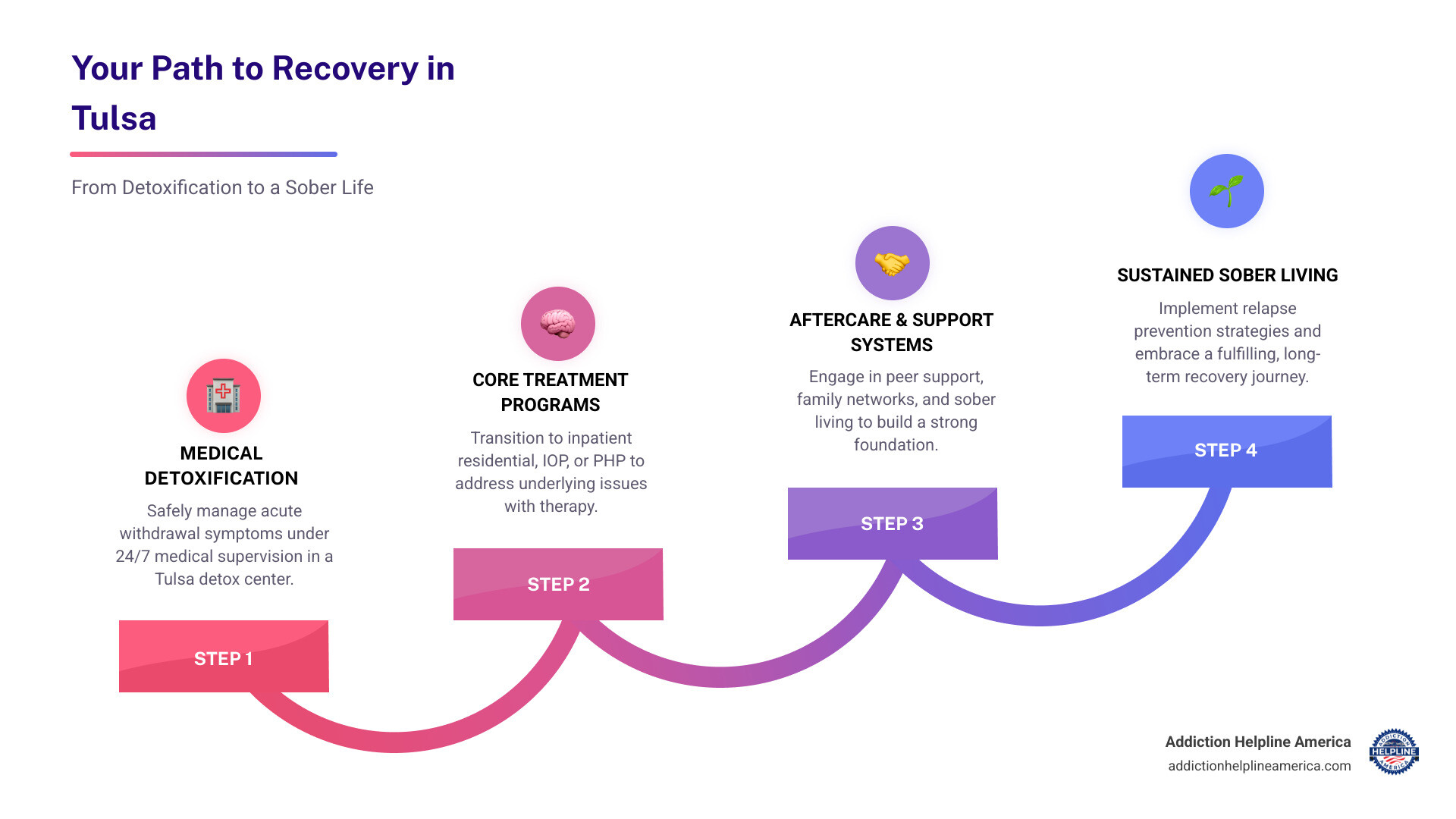
Finding Hope: Why Professional Detox Matters in Tulsa
Detox centers in tulsa provide vital medical supervision for individuals withdrawing from drugs or alcohol. They offer a range of services, from 24-hour inpatient care to outpatient programs, with most accepting insurance, Medicaid, or offering sliding scale payment options.
Quick Guide to Detox Centers in Tulsa:
- Inpatient Detox: 24/7 medical supervision in a residential setting for severe withdrawal symptoms
- Outpatient Detox: Regular check-ins while living at home for moderate withdrawal symptoms
- Medication-Assisted Treatment (MAT): Use of FDA-approved medications to ease withdrawal and cravings
- Average Cost: $52,085 in Tulsa (below both state and national averages)
- Payment Options: Private insurance, Medicaid (19 programs), Medicare, TRICARE (6 programs), sliding scale fees, and self-pay
Tulsa County faces significant substance use challenges, with one of the highest overdose hospitalization rates in the country. Opiates and prescription anxiety medications are major contributors, and statewide, 94 Oklahomans are hospitalized for drug abuse weekly.
Despite these statistics, there is hope. The Tulsa area has numerous detox centers offering evidence-based care. These programs provide the medical oversight and structured support needed to manage withdrawal safely and start the path to recovery.
Detox is the critical first step. Withdrawal symptoms can be severe and even life-threatening, depending on the substance. Alcohol and benzodiazepine withdrawal can cause seizures, while opioid withdrawal is uncomfortable. Medical support makes this process safer and more manageable.
At Addiction Helpline America, we connect people with the right detox centers in tulsa and throughout Oklahoma. We understand the local resources and challenges, and our mission is to provide confidential guidance to help you or your loved one find the right treatment and begin recovery.
Detox centers in tulsa terms made easy:
Understanding the Need for Professional Detox
It’s important to distinguish between substance use and chemical dependency. Dependency occurs when the body and brain adapt to a substance, creating a physical and psychological need. At this stage, professional detox is not optional—it’s essential for safety.
The benefits of supervised detox are significant. Professional detox centers in Tulsa provide medical oversight to keep you safe as your body reacts to the absence of the substance. This isn’t about willpower; it’s about managing a biological response that can be unpredictable and dangerous.
Patient safety is the top priority. With 24/7 medical monitoring, staff can prevent or manage complications, administer medication to ease discomfort, and increase the likelihood of a successful detox. A structured environment also removes you from triggers and stressors, allowing you to focus solely on healing.
Why Supervised Detox is Crucial
Withdrawal can be dangerous, which is why attempting it alone is not recommended.
For substances like alcohol and benzodiazepines, withdrawal can be life-threatening, causing complications like seizures or delirium tremens (DTs). These are medical emergencies requiring immediate intervention.
Opioid withdrawal, while typically not fatal, is miserable. Symptoms like severe body aches, nausea, and anxiety are so overwhelming that many relapse simply to find relief. In a supervised setting, medical staff can manage these symptoms, making the process far more tolerable.
Professional detox provides 24/7 medical monitoring, ensuring you are never alone. Staff check vital signs, adjust medications, and respond to any issues immediately. This constant care provides both physical safety and peace of mind.
Detox is also an emotional and psychological battle. Professional centers offer counseling and support to address the anxiety and depression that accompany withdrawal. This comprehensive approach, treating both body and mind, creates a stable foundation for long-term recovery.
Navigating Detox Centers in Tulsa
Finding the right support is a personal journey. Detox centers in tulsa are integrated into the community, offering connections to local counseling, support groups, and aftercare programs. This local expertise allows for personalized treatment plans that address the unique challenges of residents. Recovery is a process, and the goal is to find the right fit for your specific needs.
Types of Detox Services Available
Detox centers in tulsa offer various levels of care to match different needs:
- Inpatient detox provides 24/7 medical supervision in a residential setting. It’s best for severe dependency or complex withdrawal, offering a highly structured and safe environment.
- Outpatient detox allows you to live at home while attending regular treatment sessions. This is suitable for moderate withdrawal symptoms if you have a stable home environment and need to maintain work or family duties.
- Intensive Outpatient Programs (IOP) involve several hours of treatment per day, multiple days a week, offering more structure than standard outpatient care.
- Partial Hospitalization Programs (PHP), or “day treatment,” provide full-day programming while you return home at night. It’s a step down from inpatient but more intensive than IOP.
- Medication-Assisted Treatment (MAT) combines FDA-approved medications (like buprenorphine or naltrexone) with counseling. MAT is highly effective for opioid and alcohol use disorders, as it eases withdrawal and cravings, allowing the brain to heal while you develop recovery skills.
What to Expect During the Detox Process
The detox process begins with a comprehensive initial assessment to understand your substance use history and health. This allows clinicians to create an individualized care plan.
The withdrawal timeline varies based on the substance, usage history, and your health.
- Alcohol: Symptoms typically begin within 6-12 hours, peak at 24-72 hours, and can last a week. Severe cases can lead to seizures or DTs, making medical supervision critical.
- Opioids: Withdrawal from heroin or painkillers starts within 6-12 hours and is uncomfortable, with symptoms lasting about a week.
- Benzodiazepines: Withdrawal from medications like Xanax can be complex and dangerous, with a risk of seizures. It requires a slow, medically supervised tapering schedule.
Throughout detox, you receive continuous medical support to manage symptoms and ensure safety. Psychological counseling is also integrated to help you cope with emotional distress and prepare for the next steps.
For more detailed information about what detox looks like and our specific services, visit our detox services page.
How to Choose a Reputable Detox Center in Tulsa
When choosing from the many detox centers in tulsa, look for these key indicators of quality:
- Accreditation: Ensure the facility is accredited by organizations like CARF or The Joint Commission. LegitScript accreditation is another positive indicator.
- Staff Credentials: The center should employ licensed and experienced medical professionals and therapists.
- Evidence-Based Therapies: Look for proven methods like Cognitive Behavioral Therapy (CBT) or Dialectical Behavior Therapy (DBT).
- Individualized Treatment: Quality centers tailor their approach to your unique needs, avoiding a one-size-fits-all program.
- Dual Diagnosis Treatment: If you have a co-occurring mental health condition like anxiety or depression, the center must be equipped to treat both simultaneously.
- Aftercare Planning: A good center helps you plan your next steps for continued support before you leave.
The Next Steps After Completing Detox
Detox is the first step. Building a life in recovery requires continued effort and support.
Transitioning to further treatment is crucial. Options include:
- Inpatient residential programs for continued, intensive support in a structured environment.
- Outpatient programs (IOP/PHP) for ongoing therapy while living at home, helping you reintegrate into daily life with professional support.
- Sober living homes offer a supportive, transitional environment to practice sobriety with a community of peers.
Aftercare support, such as ongoing counseling and peer groups like AA or NA, provides a vital safety net. You will also develop relapse prevention strategies to identify triggers, manage cravings, and build a strong support system. Addiction Helpline America helps coordinate these next levels of care for a seamless transition to lasting recovery.
Paying for Treatment and Finding Support in Tulsa
Concerns about the cost of treatment should not be a barrier to getting help. In Tulsa, many options make care accessible. Oklahoma’s Mental Health Parity laws require most insurance plans to cover addiction treatment similarly to physical health conditions. At Addiction Helpline America, our goal is to connect you with the right support, regardless of your financial situation.
Payment Options for Detox Services in Tulsa
The average cost of addiction treatment in Tulsa is $52,085. This is below both state ($54,475) and national ($57,193) averages, and most detox centers in tulsa offer multiple payment methods.
- Private Health Insurance: 13 facilities near Tulsa accept private insurance. We can help you verify your benefits.
- Medicaid: 19 rehab programs in the area accept Medicaid, providing a vital option for those with limited income.
- Medicare: This is also an option at certain facilities that accept it.
- TRICARE: 6 rehabs in the Tulsa area accept TRICARE for military families.
- Self-Pay/Sliding Scale: For those without insurance, 14 facilities accept self-pay, and many offer sliding scale fees based on income.
Other options include state-funded programs (7 in the area) and IHS, tribal, and ITU funding for Native American populations (5 programs). Don’t hesitate to ask facilities about scholarships or payment plans.
The bottom line? Where there’s a will, there’s a way. We’ve seen people from all walks of life find a path to treatment. Let us help you find yours.
Key Addiction Resources and Crisis Support
Recovery extends beyond a facility into the community. Tulsa has a rich network of support.
Peer support groups like Alcoholics Anonymous NE Oklahoma, the Oklahoma Region of Narcotics Anonymous, and The Northeast District of Oklahoma Cocaine Anonymous offer the lived experience of others in recovery.
Family support networks like the Oklahoma Family Network (OFN) provide advocacy and resources for families affected by addiction.
When crisis strikes, immediate help is available. If you or a loved one is experiencing a life-threatening emergency, dial 911 without hesitation. For non-emergency guidance, local resources can help. The Tulsa Health Department (THD) offers prevention programs and treatment referrals. The Mental Health Association Oklahoma (MHAOK) provides recovery support services, recognizing the link between mental health and addiction.
These resources, combined with professional care from detox centers in tulsa, create a comprehensive safety net. You don’t have to do this alone. Recovery happens in community.
Frequently Asked Questions about Detox in Tulsa
How long does detox typically last?
The duration of detox varies depending on the substance type, usage history, and your individual health.
- Alcohol and Opioid Detox: The acute phase typically lasts 5 to 10 days.
- Benzodiazepine Detox: This often requires a longer, carefully managed tapering process to prevent dangerous complications.
Most medically supervised detox programs at detox centers in tulsa last between 3 to 10 days. However, post-acute withdrawal symptoms (PAWS), like mood swings and cravings, can linger for weeks or months, highlighting the need for continued treatment after detox. A medically supervised process ensures you have the support needed to manage the experience safely and comfortably.
Can I be forced to go to detox in Oklahoma?
In Oklahoma, adults generally cannot be forced into treatment against their will. Voluntary treatment is always preferred and is far more effective.
There are, however, limited exceptions for involuntary commitment. This can occur through emergency detention if a person is an immediate danger to themselves or others due to substance use. A court may also order treatment as an alternative to incarceration for certain offenses. For minors, parents can typically make treatment decisions on their behalf.
At Addiction Helpline America, we focus on compassionate intervention to encourage voluntary treatment, as this leads to the best long-term outcomes.
What should I bring with me to a detox center?
Packing for a detox program can be straightforward. Always confirm with your specific facility, but here are general guidelines.
What to Bring:
- Several days’ worth of comfortable, layered clothing (no drug-related or offensive logos).
- Basic personal hygiene items like a toothbrush, toothpaste, and soap (avoid products containing alcohol).
- A list of all your current medications, dosages, and your prescribing doctor’s information.
- Your insurance card and a list of emergency contacts.
- A book or journal for quiet time.
What to Leave at Home:
Most centers have strict prohibited items lists. These typically include electronics (phones, laptops), valuables, large amounts of cash, any illicit substances or alcohol, outside medications not approved by staff, and weapons. Pack light and focus on your health and recovery.
Conclusion: Your Path to Recovery in Tulsa Starts Today
The journey to recovery is a courageous one, and it starts with the knowledge that help is available. Detox centers in tulsa offer a range of services, from inpatient to outpatient care, designed to guide you safely through withdrawal and build a foundation for lasting sobriety.
As this guide has shown, there are options for every need and financial situation. Recovery is possible, and we have seen countless individuals reclaim their lives from addiction. That same hope exists for you or your loved one.
At Addiction Helpline America, we provide free, confidential guidance to connect you with the right program from our network of treatment centers. We are here to answer your questions and help you steer your options without judgment.
Taking the first step is the most important one. You don’t have to have all the answers, and you don’t have to do it alone.
Your path to recovery in Tulsa can start today. The support you need is waiting. Find the right medical detox program in Tulsa, OK, and let us help you begin the journey toward healing and hope.
Our helpline is 100%
free & confidential
If you or someone you care about is struggling with drug or alcohol addiction, we can help you explore your recovery options. Don’t face this challenge alone—seek support from us.
Programs
Resources
Will my insurance
cover addiction
treatment?
We're ready to help
Find the best
drug or alcohol treatment
center
Are you or a loved one struggling with addiction? Call today to speak to a treatment expert.

















